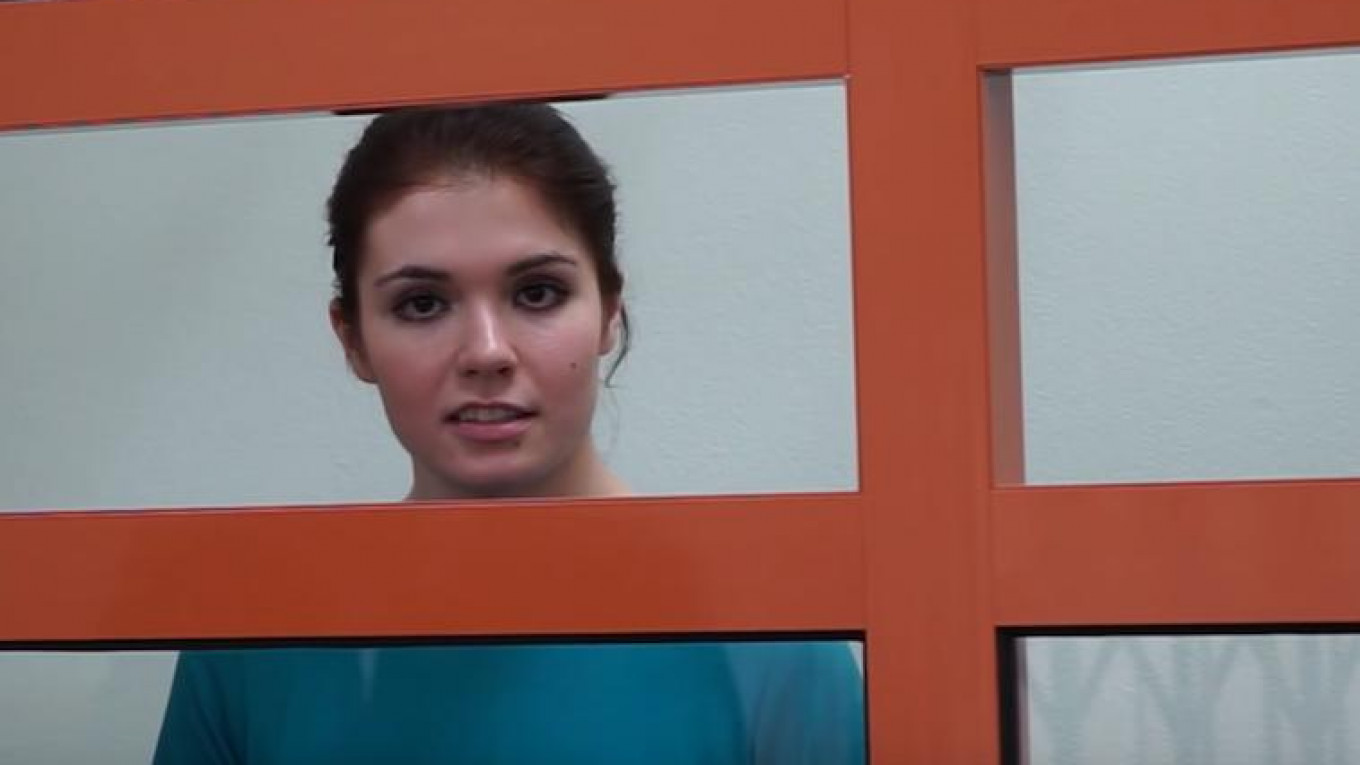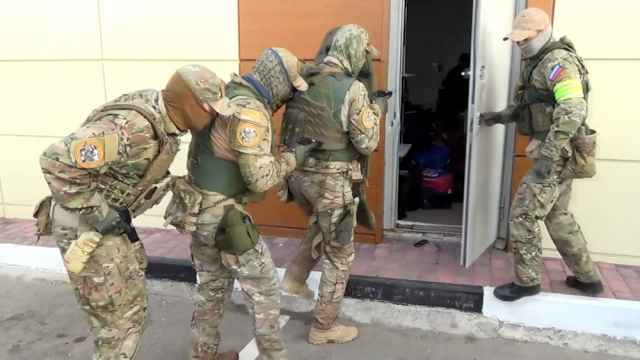Varvara Karaulova — she legally changed her name to Alexandra Ivanova, but everyone still calls her Varvara — sits inside the defendant’s dock, in her elegant turquoise dress, and cries. “Your honor, please allow us to pass a handkerchief to the defendant — she is in tears,” says her lawyer Sergei Badamshin.
“Can we allow this?” the judge asks the police officers guarding Karaulova in the courtroom. “No, this is not allowed,” one of them answers unemotionally. “Parcels are only allowed in pre-trial detention.”
It is the seventh hearing of the trial, and Karaulova’s father, Pavel, is on the stand testifying. After a year confined to the Lefortovo pre-trial detention prison, infamous for its poor conditions, Varvara underwent an unexpected transition. The frightened, depressed girl who hid from cameras in her coat’s hood turned into an attractive young woman who wears make up, smiles confidently and exchanges jokes with her lawyers.
But even this new, confident Varvara couldn’t hold back her tears as she listened to her father’s voice cracking as he described the day she disappeared. The defense maintains that she ran off, blind with love, to marry her fiancé — who turned out to be an IS* recruiter — in Syria. But the prosecution claims she departed to join the Islamic State terrorist organization, ready to fight for the Caliphate. If convicted, Karaulova faces up to 5 years in prison.
Pavel would never forget that day, he said. He and his ex-wife, Varvara’s mother, made thousands of calls that day — to their daughter’s friends, her teachers, the police, emergency services. With little help from the state agencies, Karaulov ended up going to Turkey on his own, looking for Varvara, eventually locating her and bringing her home — only to have her arrested half a year later.
There is, indeed, no place where families whose children fall under the influence of IS recruiters, can go and ask for help, says Zoya Svetova. A journalist, prominent human rights activist, and former member of a Public Watch Commission, she frequently inspected the Lefortovo prison where Karaulova was kept and has followed the case extensively.
“They have nowhere to run to. The rescue of a drowning man is the drowning man’s own job,” Svetova told The Moscow Times. “No one apart from the FSB can interfere and help, but this ’help’ usually lands the person in question behind bars.”
The Long Way Home
Varvara Karaulova, a 19-year-old philosophy student who lived with her divorced mother Kira, didn’t come home on May 27, 2015. Her worried parents rushed to their local police station. Usually, Russian law enforcement opens a missing person case only 72 hours after a person disappears, but Pavel Karaulov convinced police officers to start the investigation immediately. “They must have seen trepidation in our eyes and that made them meet us halfway,” he said in court.
During the next several days, Karaulov would call, visit, and submit official requests to every law enforcement body he could think of: the Prosecutor’s Office, the Federal Security Service (FSB), the Investigative Committee, and the Moscow Police. He would also call Varvara’s friends and teachers.
Much to his surprise, he found out that his daughter, baptized in the Russian Orthodox Church, wore long skirts to university and covered her head with a shawl to make her look like a Muslim. Varvara’s peers also told him that Varvara had a boyfriend for three or four years, a Muslim who lived outside of Russia, whom she had never met and with whom she only corresponded on social networking sites.
Through personal connections — Karaulov reportedly used to work for an IT firm that dealt with various government institutions — he found out that Varvara got herself an international passport and bought a plane ticket to Istanbul.
People who knew about the family’s situation told Karaulov that women were being transported to Syria through Turkey. Armed with this knowledge, Karaulov spent another two days “running back and forth” between different law enforcement agencies. But he encountered little enthusiasm among law enforcement.
“All in all, my friends told me that I was the only one who could help our family, and the thing I should do was go to Turkey [and look for Varvara myself],” Karaulov said in court.
Unlike in Russia, Turkish law enforcement was eager to help: the morning after Karaulov arrived in Istanbul, they launched a special operation to locate Varvara. They found her in a matter of days: she and a group of other people had been detained by migration authorities for traveling without ID. The group was on its way to the Syrian border.
Karaulov finally met his daughter at an immigration camp where the detained group was transferred. “We hugged and cried for 15 minutes,” he said. “The only thing Varya said that day was ’Daddy, I made a mistake. Take me home.’”
Cooperation and Arrest
In conversation with The Moscow Times after Monday’s court hearing, Karaulov said that he was grateful for the assistance he received from many people in law enforcement. However, on the whole, the system was slow to address his situation.
“Take the Turkish prosecutor [I met in Istanbul]. My first question to him was: ’Do you have children?’ He said he did, and showed immediate readiness to hear me out,” Karaulov said. “Compare that with the FSB: I arrived at their office at 5 pm on a Friday with my formal request, and their answer was: ’Okay, on Monday we will see whether we can do something about it.’”
Upon her return to Moscow, Karaulova — severely depressed, according to her father — was interrogated by Russian law enforcement and released. In July, Vladimir Markin, then the spokesman for the Investigative Committee, even made a public statement that no criminal charges would be brought against the girl.
Back home, Karaulova struggled with constant media attention: TV crews not only followed her father to Istanbul, they also followed father and daughter back to Moscow. They spent days in front of the residential building where Karaulova lived and attempted to track her every step. Tired of attention, Varvara decided to make a new start. She changed her name to Alexandra Ivanova, and believed she would now, finally, have a clean slate.
However, the FSB made her continue to correspond with the man she considered her boyfriend — a recruiter for the Islamic State. “In September 2015 Varya told us: ‘Mom, dad, I can’t do this anymore.’ But they basically forced her to communicate with this online friend,” Pavel Karaulov said in court. Varvara asked her parents to take all the gadgets away from her and make them available only when she was giving French lessons in Skype.
Just a month later, in October 2015, the girl was arrested and charged with preparing to join a terrorist organization.
The authorities claimed she changed her name in order to try and flee back to Syria. She also contacted the recruiter once again, they said, which amounts to attempting to join a terrorist organization. Her parents and the defense team maintain that the law enforcement knew and approved of both the name change and contacting the recruiter.
So far, the ongoing trial offers more questions than answers.
“The prosecution’s case is based on suppositions, guesses and speculations. ... Their charge sheet mentions the term ’unidentified’ — unidentified people, circumstances, places — eight times. I counted,” Karaulova’s lawyer Sergei Badamshin told The Moscow Times.
Several witnesses who testified during the investigation examined interrogation protocols and “didn’t recognize their own words,” he said. “Now they are telling the truth.” They changed their testimony in court, and say Karaulova was planning to marry her fiancé, not join IS.
Used and Thrown Away
To put it simply, the FSB used the girl, Svetova says. “She gave them everything they wanted and needed [for their investigation], and when they didn’t need her anymore, when they needed to report closing a terrorist case, they arrested her,” Svetova told The Moscow Times. “It is much more difficult to catch real terrorists and spies, and Varvara was an easy target.” This, she says, is why Karaulova’s case stands out: usually the so-called “siloviki” are much more merciful to those who cooperate.
People like Karaulova, who fall under the influence of terrorist recruiters, usually need psychological rehabilitation, the human rights advocate added, but the authorities didn’t offer Karaulova any: “Her parents had to run around Moscow themselves, looking for therapy specialists. But if the state declares that it cares about its citizens, it should offer help.”
By undergoing therapy and changing her name, Varvara was on the road to rebuilding her life.
“And law enforcement knew it — they were watching her all this time,” Svetova said. “They just conned her.”
*Islamic State is a terrorist organization banned in Russia.
A Message from The Moscow Times:
Dear readers,
We are facing unprecedented challenges. Russia's Prosecutor General's Office has designated The Moscow Times as an "undesirable" organization, criminalizing our work and putting our staff at risk of prosecution. This follows our earlier unjust labeling as a "foreign agent."
These actions are direct attempts to silence independent journalism in Russia. The authorities claim our work "discredits the decisions of the Russian leadership." We see things differently: we strive to provide accurate, unbiased reporting on Russia.
We, the journalists of The Moscow Times, refuse to be silenced. But to continue our work, we need your help.
Your support, no matter how small, makes a world of difference. If you can, please support us monthly starting from just $2. It's quick to set up, and every contribution makes a significant impact.
By supporting The Moscow Times, you're defending open, independent journalism in the face of repression. Thank you for standing with us.
Remind me later.






